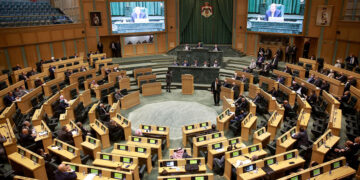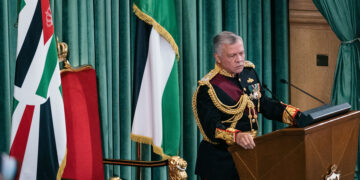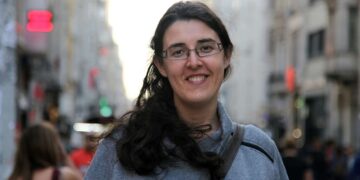Following Purge of Sitting Judges, Prosecutors and Judges Loyal to Crown Prince Appointed as Terrorism Court Judges, Handing Down Extreme Sentences for Minor Social Dissent
(Washington, D.C., October 12, 2022) – In an unprecedented move, Saudi Arabia has issued a royal decree appointing a detective involved in covering up the murder of Jamal Khashoggi as President of the country's counter-terrorism court, as well as detectives and prosecutors loyal to the Crown Prince to serve as judges for the court, said Democracy for the Arab World Now (DAWN).
In the wake of these appointments, the court has issued several extreme prison sentences, overturning much shorter sentences issued by lower courts, including sentencing two Saudi women to 34 and 45 years in prison, respectively, for their use of social media. These appointments followed the arrest and removal of at least nine prominent judges by the State Security Agency on April 11, 2022.
"The Crown Prince is appointing loyalist security officials who lack even basic training as judges to its kangaroo 'counter-terrorism' court, punishing the mildest social dissent with shocking sentences," said Abdullah Alaoudh, Gulf Director at DAWN. "Rewarding a detective involved in the cover-up of Jamal Khashoggi's murder with an appointment to head this court is only the latest snub to accountability for the murder, and a glimpse into the government's staggering disregard for justice and due process."
The June 9 royal decree, a non-public document obtained by DAWN announcing the appointment of at least ten detectives and prosecutors to serve as judges in the Specialized Criminal Court, is unprecedented in Saudi Arabia. For example, one of those appointed is Abdullah bin Shayea al-Qahtani, who served previously as a prosecutor in the Public Prosecution's State Security Circuit. Typically judges must complete at least two years of judicial training and complete studies at the High Judicial Institute, in addition to obtaining a bachelor's degree in law or its equivalent. The appointments followed the purge of at least nine sitting judges in the Terrorism Court, the Terrorism Appeals Court and the High Court by the State Security Agency, which arrested them and charged them with treason. There is no information on whether these judges are being prosecuted.
The new appointments include Detective Awadh bin Ali bin Ayedh al-Mayshar al-Ahmari to serve as President of the Specialized Criminal Court. Al-Ahmari was involved in the coverup of the Khashoggi murder in Istanbul, traveling in 2018 with Attorney General Saud al-Mojeb to the Saudi Consulate in Istanbul ostensibly to investigate the murder. But according to the United Nations' report of the Special Rapporteur on Extra-Judicial, Summary or Arbitrary Executions , the Saudi delegation helped to clean up evidence of the crime, preventing Turkish authorities from investigating the premises, and providing false information to the public about what had transpired. Attorney General al-Mojeb decided not to indict the the crown prince's right hand man, Saud al-Qahtani, even though he was identified by the U.N. and the U.S. Office of Director of National Intelligence as the mastermind of the operation. The Saudi prosecutors also gave contradictory statements about the murder and failed to investigate the location of Khashoggi's remains.
Al-Ahmari and the other detectives and prosecutors recently appointed as judges have close ties to the Saudi Royal Court and Saudi Crown Prince Mohamed bin Salman (MBS), according to a senior official in the Saudi judiciary interviewed by DAWN on August 20, 2022. These sources also confirmed that al-Ahmari and other recently appointed judges previously worked in the State Security Circuit within the Public Prosecution Office, which has been responsible for harassing, interrogating and prosecuting social critics in the country. One source close to a prominent Saudi human rights defender told DAWN on September 7, 2022 that al-Ahmari interrogated their family members about the defender's peaceful political activism and extracted forced confessions from the family members.
"The appointment of these MBS loyalists to control the country's notorious terrorism court will put the judiciary's role in Saudi repression on steroids," said Alaoudh. "The most recent sentences of 34 and 45 years imprisonment against women whose only crime was tweeting in support of reform should tell you all you need to know about how MBS intends to use his cronies to terrorize Saudi citizens."
Established in 2008, Saudi officials created the Specialized Criminal Court to try terrorism-related cases but authorities have used it as a tool to attack dissenting voices in the country, and many of the court's decisions have featured unfair trials and extreme sentences against human rights defenders, political activists, and religious minorities. The court has also overseen unfair mass trials, including trials that resulted in death sentences for 81 people. The Saudi government executed these 81 individuals by beheading and firing squad on March 12, 2022.
The Specialized Criminal Court has jurisdiction over terrorism and security-related cases brought under the country's notorious Counter-Terrorism Law, which criminalizes criticism of the government or monarchy as "terrorist" offenses. Human rights organizations and UN bodies have repeatedly criticized this law and the Anti-Cyber Crime Law for allowing the government to repress Saudi citizens and undermine human rights. Both laws are purposely vague to give Saudi authorities maximum discretion with little to no accountability for overreach. In April,
Saudi Arabia has seen a dramatic increase in extreme prison sentences against political activists and human rights defenders following President Biden's meeting with MBS in Jeddah last July. On August 8, the Specialized Criminal Court sentenced Salma al-Shehab, a mother of two and Ph.D. student at Leeds University, to 34 years in prison and a 43-year travel ban for her use of social media. The next day, the court sentenced Nourah bint Saeed al-Qahtani, a 49-year-old mother of five, to 45 years in prison and a 45-year travel ban for tweeting. The same month, the court sentenced Abdulilah al-Huwaiti to 50 years in prison and a 50-year travel ban for publicly supporting his family's refusal to be forcibly evicted from their home to make way for NEOM construction. It also sentenced Osama Khaled, a writer, translator, and computer programmer, to 32 years in prison, after a lower court sentenced Khaled to five years in prison on allegations related to his freedom of expression. Saudi authorities have already detained Khaled since 2020.
"There's no mistaking the fact that President Biden's fist-bump with MBS has ushered in an even more extreme level of oppression and human rights violations in Saudi Arabia," Alaoudh said. "The families of al-Shehab, al-Qahtani, al-Huwaiti, Khaled, and others will take little solace in the fact that President Biden promised to confront MBS on human rights abuses in Saudi Arabia."
DAWN has repeatedly called for Saudi culprits, including judges, to be held responsible for their roles in enabling state repression against Saudi citizens including human rights defenders, civil society leaders, democracy reformers, and religious minorities. For judges, this includes accountability for denying these individuals their fundamental due process rights during trial, upholding convictions based on insufficient evidence, and applying extreme prison sentences.
DAWN also urges the United States to end arms sales to the Kingdom, in light of the country's widespread and systematic human rights abuses. Section 502B of the Foreign Assistance Act prohibits arms sales to governments with a record of gross violations of human rights.





































